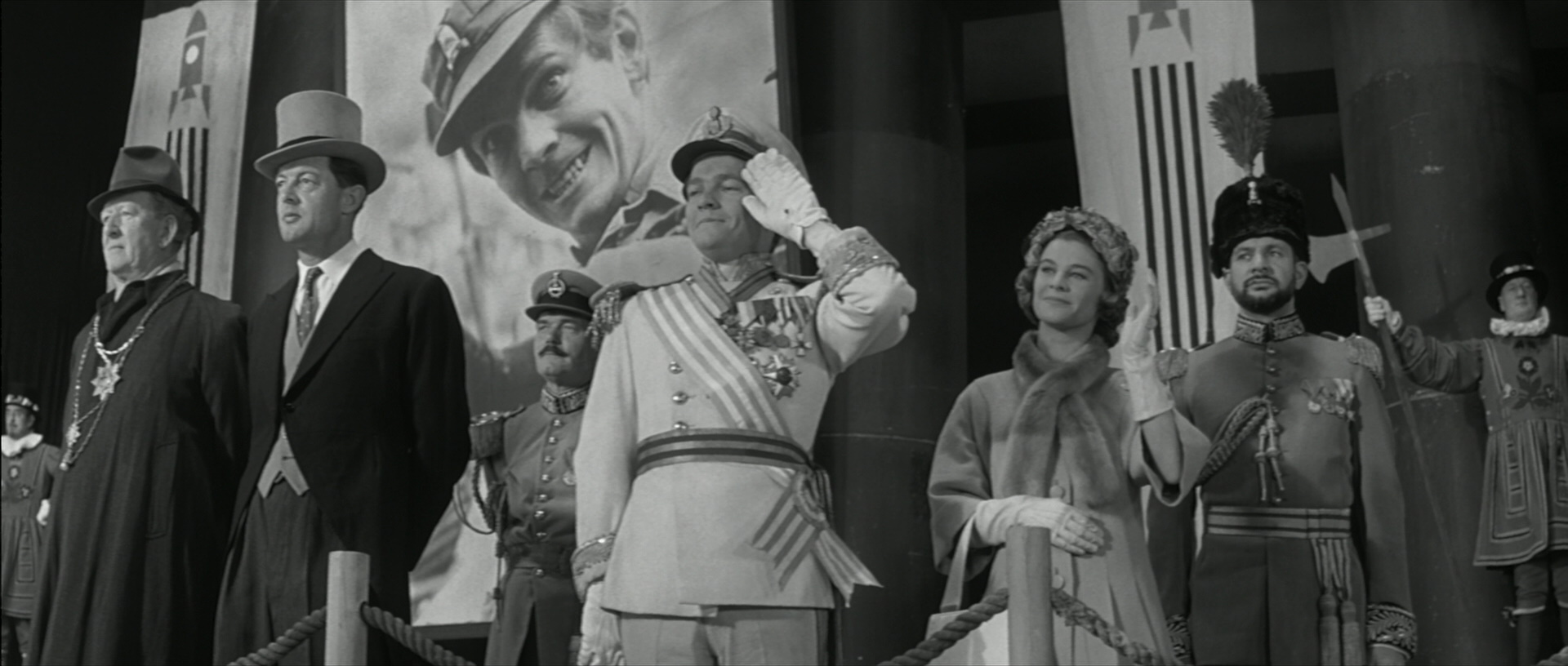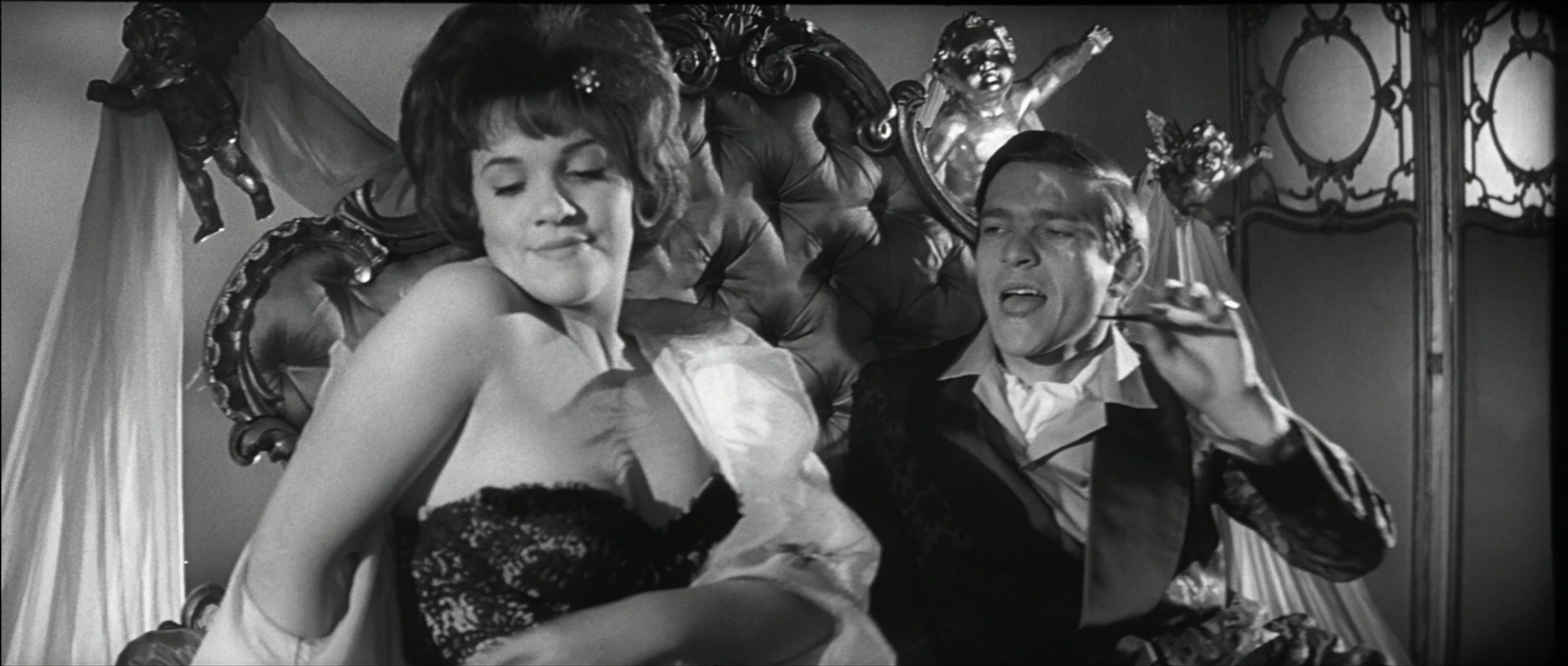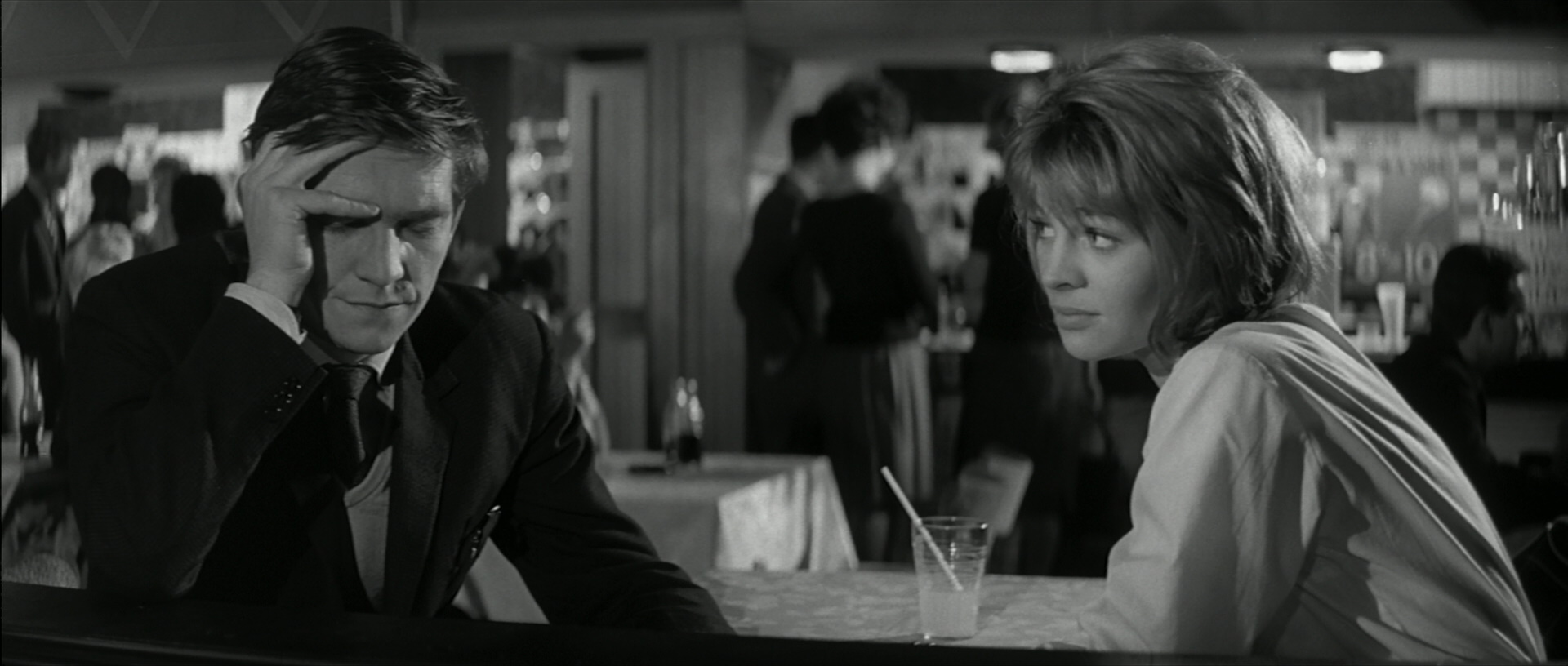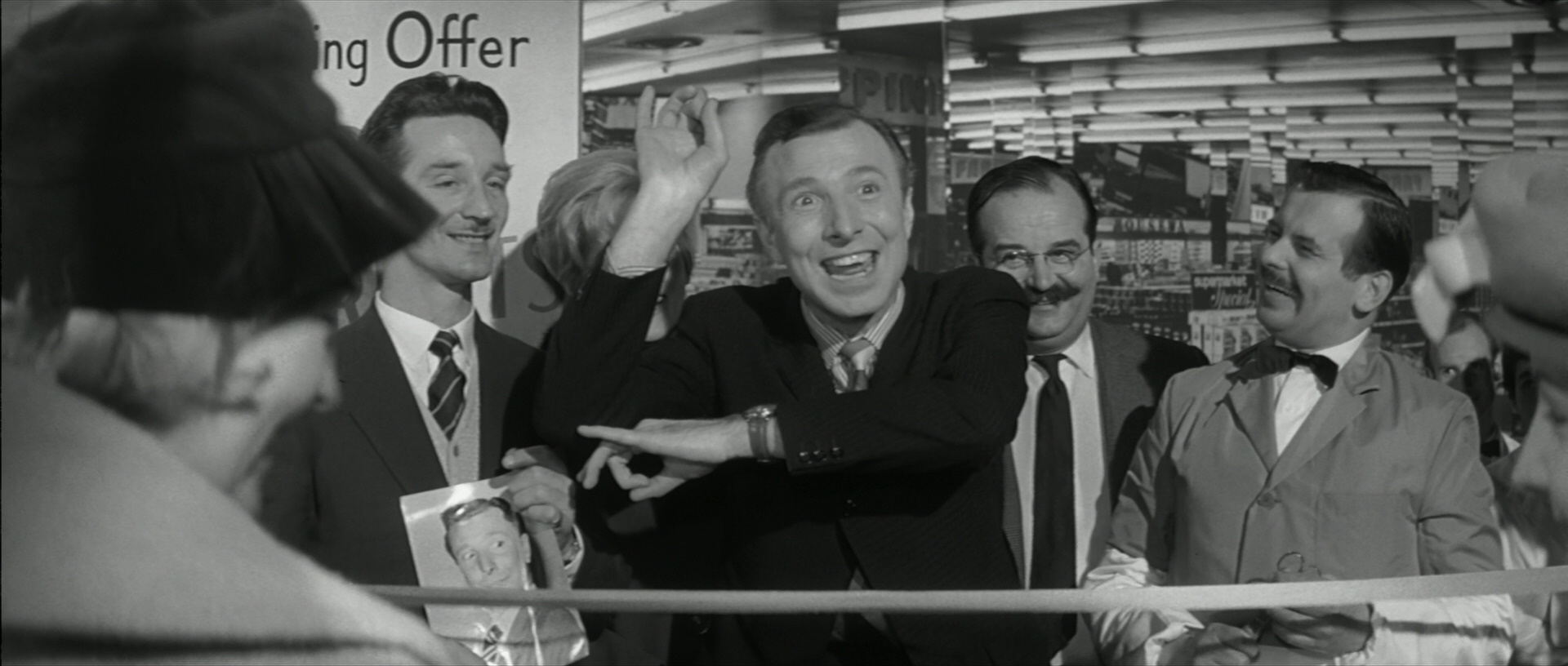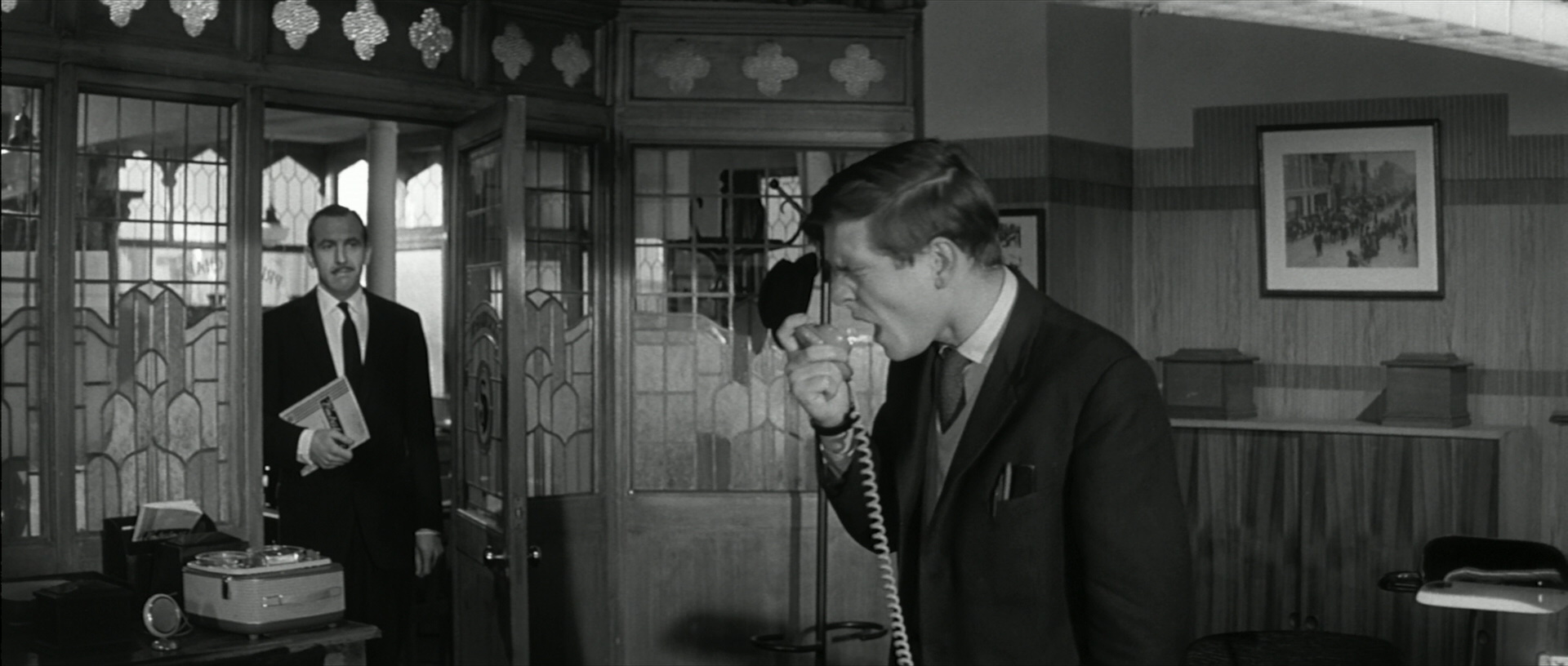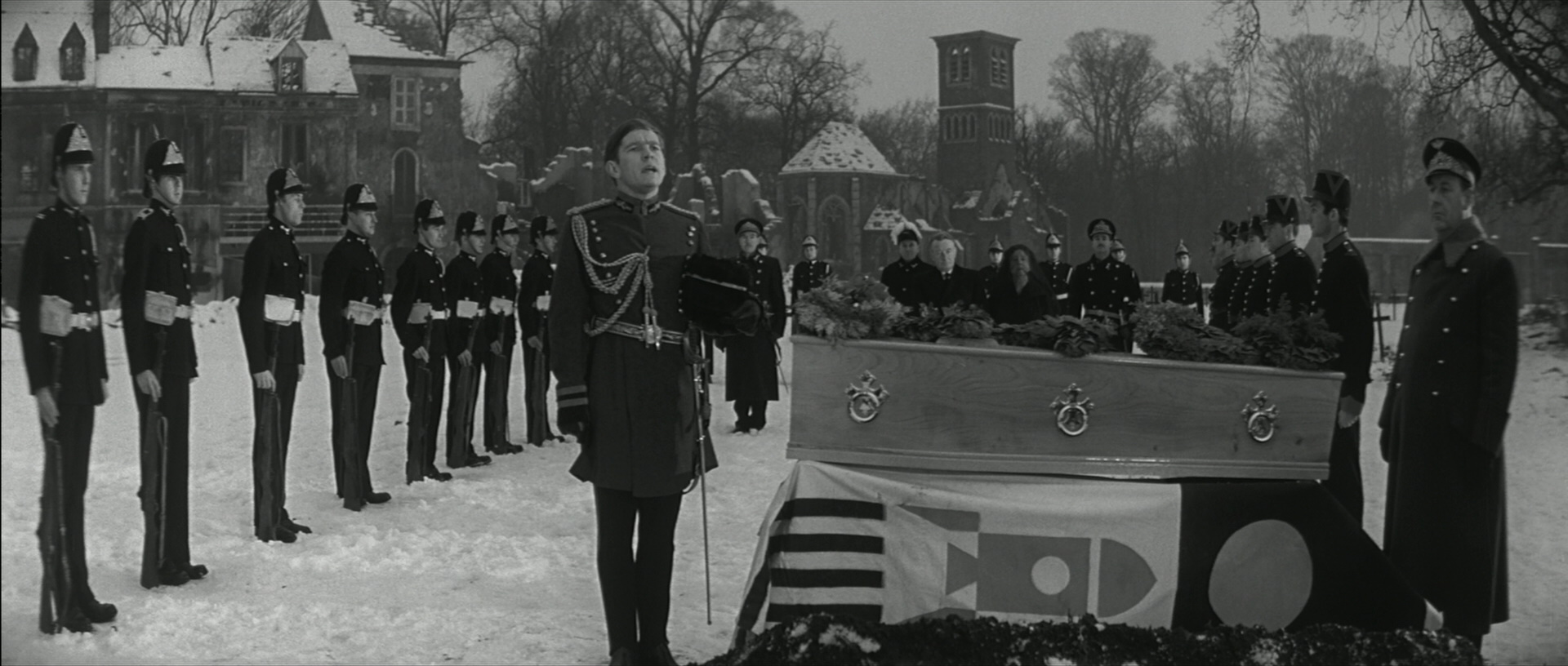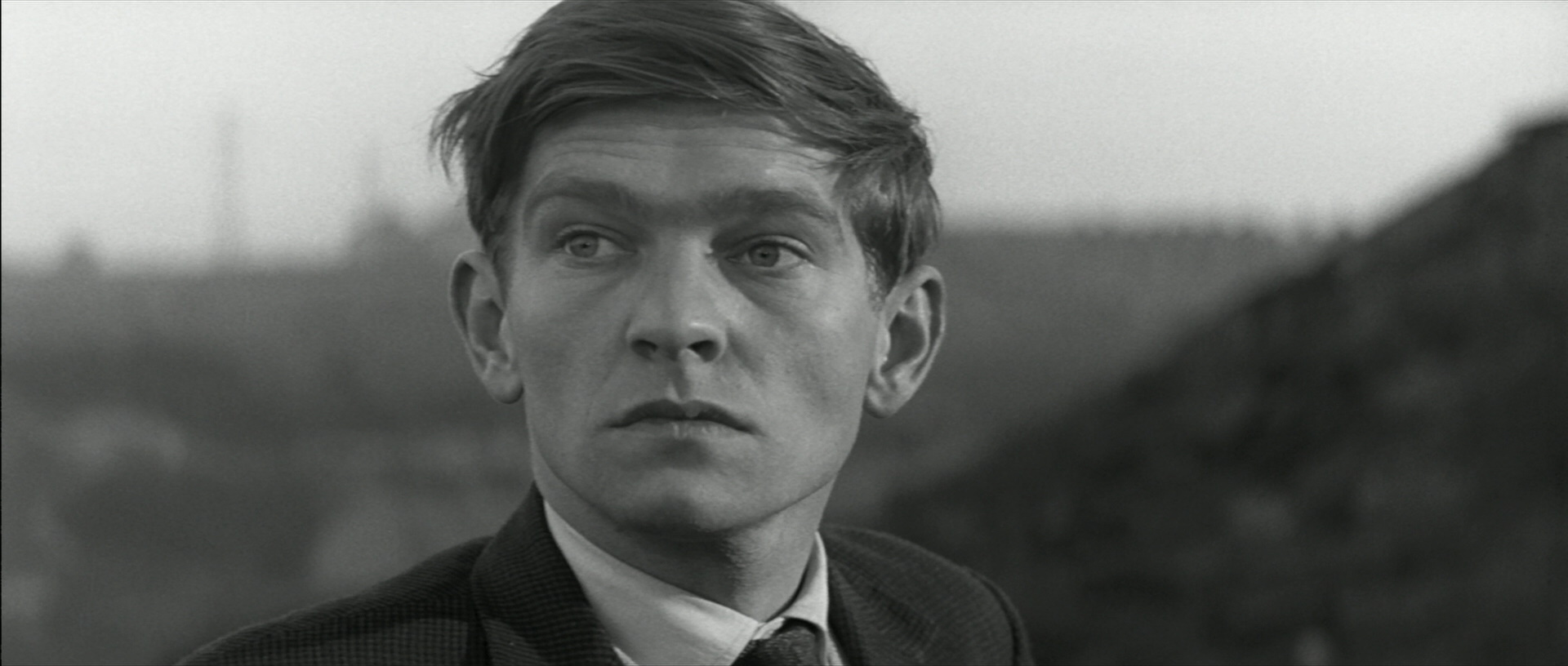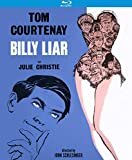| Reviews & Columns |
|
Reviews DVD TV on DVD Blu-ray 4K UHD International DVDs In Theaters Reviews by Studio Video Games Features Collector Series DVDs Easter Egg Database Interviews DVD Talk Radio Feature Articles Columns Anime Talk DVD Savant Horror DVDs The M.O.D. Squad Art House HD Talk Silent DVD
|
DVD Talk Forum |
|
|
| Resources |
|
DVD Price Search Customer Service #'s RCE Info Links |
|
Columns
|
|
|
Billy Liar
"Well, being a scriptwriter, I'm perhaps at times a bit inclined to let my imagination run away with me, as you know."
"You don't mean you've been telling me lies."
"Well, not lies, exactly. But I suppose I've been – you know – exaggerating some things a bit, being a scriptwriter. For instance, there's that business about me father: him getting danger money on a petrol tanker."
"You mean he's not on a petrol tanker?"
"He wasn't even in the Navy."
"Well, what was he, then?"
"He was a conscientious obje...no, he wasn't anything. He wasn't fit. He has trouble with his knee."
"Oh. How many other lies have you been telling me?"
Bradley is the sort of modest, sleepy village in the North of England where everybody can't help but know everybody else. Where the same cookie-cutter home on a postage stamp-sized lot is passed down in the family for generations. Where the closest thing you're likely to have a brush with celebrity is at the opening of the new supermarket. Where precious little is more thrilling than hearing the DJ announce your birthday on the wireless. Where no one aspires for more than comfort, family, and community. Where they dutifully work at their mundane jobs, they come home in the evening for a nice family dinner, and they afterwards all sit in front of the telly together. Where every day is indistinguishable from the one before it. To some, it'd be paradise. The very thought makes Billy Fisher (Tom Courtenay) want to retch.
As the song goes, there must be more than this provincial life. And for Billy, that means a career in Swinging London as a screenwriter. He proudly boasts about the job he's been offered writing for comedian Danny Boon (Leslie Randall) in the big city, and it's for the best that Billy has his foot out the door. His parents (Wilfred Pickles and Mona Washbourne) are at their wits' end. His bosses at the funeral home are certain to realize any day now that he never mailed off those promotional calendars and has been pocketing the postage money. Billy's secretly juggling two fiancées – and working towards a third – with only one engagement ring between them. And Billy can't stay ahead of the endless parade of lies he's spun for too much longer. I mean, in a town this small, how long can a tale about, oh, Billy's pop being on the verge of losing his leg really last? Still, those headaches are about to be a distant memory, as he's soon to live out a dream that none of his friends, family, or neighbors could possibly relate to. That is, unless Billy's lying to himself.
Billy is, in a great many ways, a kid who's never quite managed to grow up. And it's because of that childlike quality that he manages to remain rather sympathetic, despite the fact that he by most any measure is a sincerely wretched person. He's engaged to dim yet hopelessly sweet Barbara (Helen Fraser), but because her...errrr, bud remains closed until the two of them are wed, Billy's also gotten himself engaged to a venomous boor named Rita (Gwendolyn Watts) who lacks such compunctions. He's indolent. He's beyond inconsiderate. He steals. He attempts to drug Barbara into putting out. He obsesses over how to credit himself for a novel he's writing but can barely be bothered to type an actual sentence. He fantasizes about savagely gunning down most anyone that gives him anything resembling a hard time. It's a mighty struggle for Billy to utter more than a few words without weaving some sort of lie. He'd prefer to escape into his daydreams about reigning over the imaginary kingdom of Ambrosia rather than spend a minute more in the real world than necessary.
But like a child of a certain age – the type who would perhaps insist on that many cubes of sugar in his tea – there's no malice behind Billy's actions. Lacking a greater context, everything and everyone appears to be there to serve his desires, so when he doesn't get what he wants when he wants it, his world is thrown into disarray. Billy is the center of his universe, and the film opens as he's on the verge of exhausting what little patience and goodwill remains of seemingly everyone in his orbit. In a more traditional film, we'd look on as Billy is at long last forced to grow up, or perhaps his whimsy would wind up unexpectedly saving the day, making him the beloved hero of those who'd previously never appreciated him. But then, Billy Liar wouldn't be the enduring classic that it is – among the most defining films of the British New Wave – if were to settle for convention.
The central conflict of Billy Liar is between comfort and risk. Billy's life, as tumultuous as he's made it, is fine. He's not the least bit mistreated. He has money in his pocket, friends to call his own, and a roof over his head. Yet at the same time, he can never be happy in this unremarkable-by-design village. Here, "dreaming big" wouldn't amount to much more than opening up one's own shop on the corner. There is no aspiration for meaningfully more than they have. This is their home, as it was for generations before them and will be for generations yet to come. That's just too rigid for Billy to bear. He dreams of being exceptional...of being revered. He bristles at authority, no matter how mild their demands may be. His lies and fantasies are an escape from the ordinary. If Billy's immediate world cannot in truth be exceptional, he can at least pretend that it is.
He's all too aware that he's an oblong puzzle piece that'll never comfortably snap into place. And yet this is the life Billy has always known. However imperfect it may be, this is still home. He can take solace in that familiarity – in the certainty, no matter how badly he misbehaves or mistreats others, that there's every likelihood that things will work out. It'll never be great, no, but it'll always be okay. There are, however, the possibilities that await elsewhere. Perhaps a move to London could be a dream come true: that Billy would land a career in show business that capitalizes on his boundless imagination, that he'd discover other dreamers who share his off-kilter perception of the world around them, and that he'd be...well, happy. He could, however, upend everything he's ever known, relocate to a sprawling metropolis worlds removed from anything he's experienced, and catastrophically fail with his safety net removed.
The core of that struggle – risking one's solace in the familiar, however mediocre it may be, to uncertain ends – is as universal and relatable as they come. Billy Liar has not been a longtime favorite of mine because I want to see its title character conform. I have no interest in watching Billy emerge as a hero to people he neither understands nor understand him. I instead just want to see him try – that something so transformative is within his grasp, if only he could summon the courage to seize hold of it. The film doesn't take pains to explain why Billy is the way he is. There isn't a journey in the sense of Billy necessarily being a different character at the film's end as he is at its outset. The goal isn't to pass judgment on a young man who by any measure is deeply flawed, nor is to to change him into something more palatable; it's to get to know him. And the more time I spend with Billy, the more of my sympathy he earns. There's no schadenfreude in witnessing Billy suffer from his poor assumptions and many misdeeds; it stings to watch. There is a more fully realized character there than a first glance would suggest, and so much of that is owed to Tom Courtenay's exceptional performance – one that's more layered and richly nuanced than perhaps expected about a twentysomething who dreams about a bunch of marching amputee veterans.
Billy Liar's cast across the board is exceptional, really, so brilliantly inhabiting their characters that one is left with a vivid sense of who they are before they've scarcely uttered a word. In particular, it's little wonder that this proved to be Julie Christie's breakout role. Though her Liz has relatively little screentime, her presence is immediately arresting. It's entirely understandable that Billy would find himself every bit as transfixed by such a free spirit – that she could indeed be the agent of change to compel this dreamer to follow through. The two complement each other so well; Liz is more compelled by the journey than the destination, while Billy looks longingly at the deep end of the pool yet is reluctant to dive in. She's propelled by the confidence that everything will work out in the end, no matter how ill-defined "everything" and "the end" may be, rather than be paralyzed by a fear of the unknown. She's the one character in the film around whom Billy can drop the façades and be his true self. The volume and tone of his voice change. He's so much more vulnerable. He actually listens to her. And yet the reverse is not true. Liz is able to take such a role in Billy's life because her happiness – her compulsion to explore – is not inextricably linked to him.
I first sought out Billy Liar some twenty years ago because of the parallels I'd seen drawn to The Secret Life of Walter Mitty: the bursts of fantasy that stand in such stark contrast to a rather mundane existence. But as I was properly being introduced to the film, I found myself less interested in the daydreams themselves and more in how they inform Billy as a character. The more dramatic elements of this dark comedy pack a considerable wallop, aided in no small part by its compelling study of working class normalcy. I'm left in awe of its performances and these masterfully drawn characters. And I could easily double the length of this review were I to delve into Billy Liar's final moments, which manage to be intense and agonizing despite the film's rightly judged disinterest in an incendiary climax. Kat Ellinger notes in the disc's commentary that critical reception upon the film's release in 1963 was nothing remarkable, despite the fact that Billy Liar would soon be revered as one of the most important and influential films from the British New Wave. And it is indeed a classic: one that can't help but inspire discussion afterwards and one that rewards subsequent viewings. Billy Liar has long held a place on my Blu-ray wish list, and I'm thrilled to see it at long last find its way onto the format on these shores, even if it's not quite the newly-remastered special edition lavished with hours of extras that I'd long been dreaming of. Highly Recommended.
Video
This release of Billy Liar appears to have been sourced from the same master as Studiocanal's 2013 special edition overseas. And while the image isn't nearly as dazzlingly sharp or detailed as a newly-minted 4K remaster presumably would have been, this is still handsome enough a presentation – one that is, at the very least, an absolute revelation compared to its previous home video release on these shores:
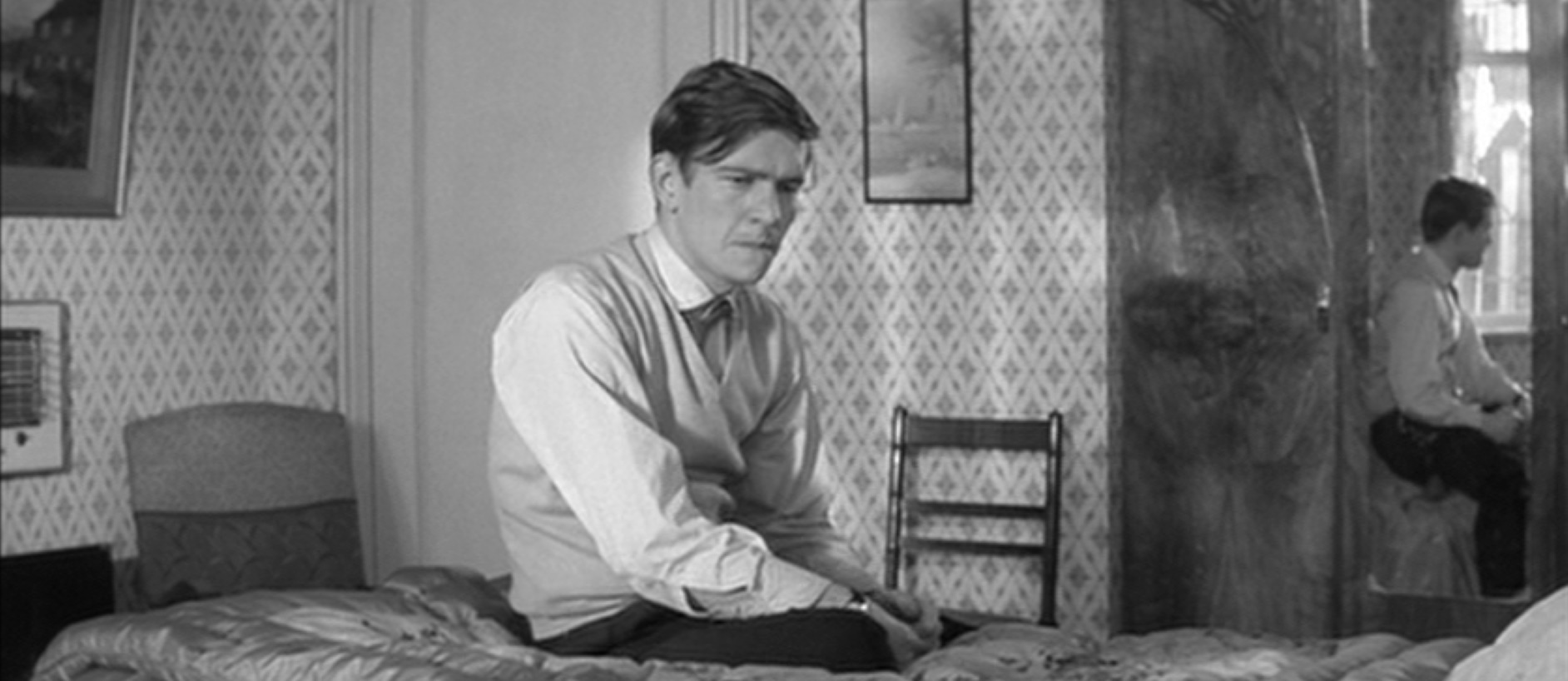 | 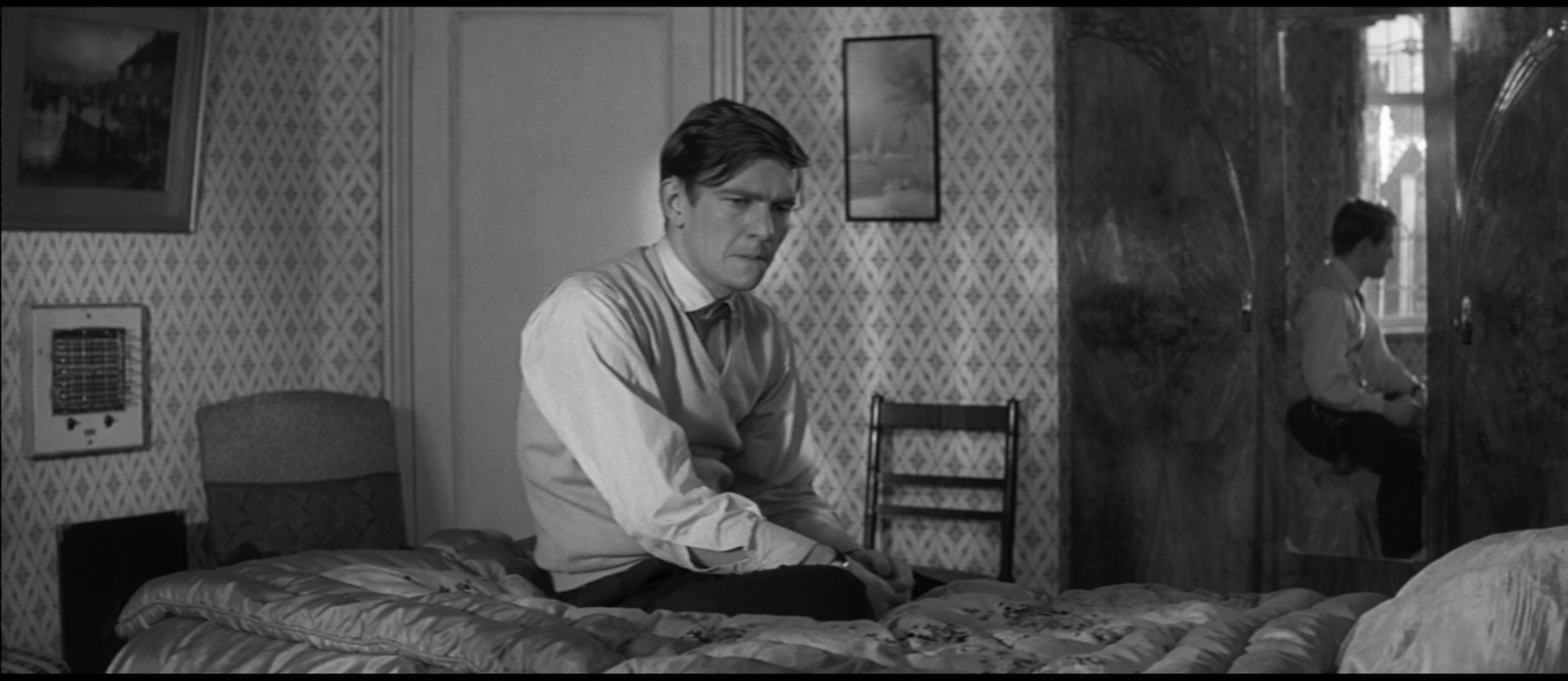 |
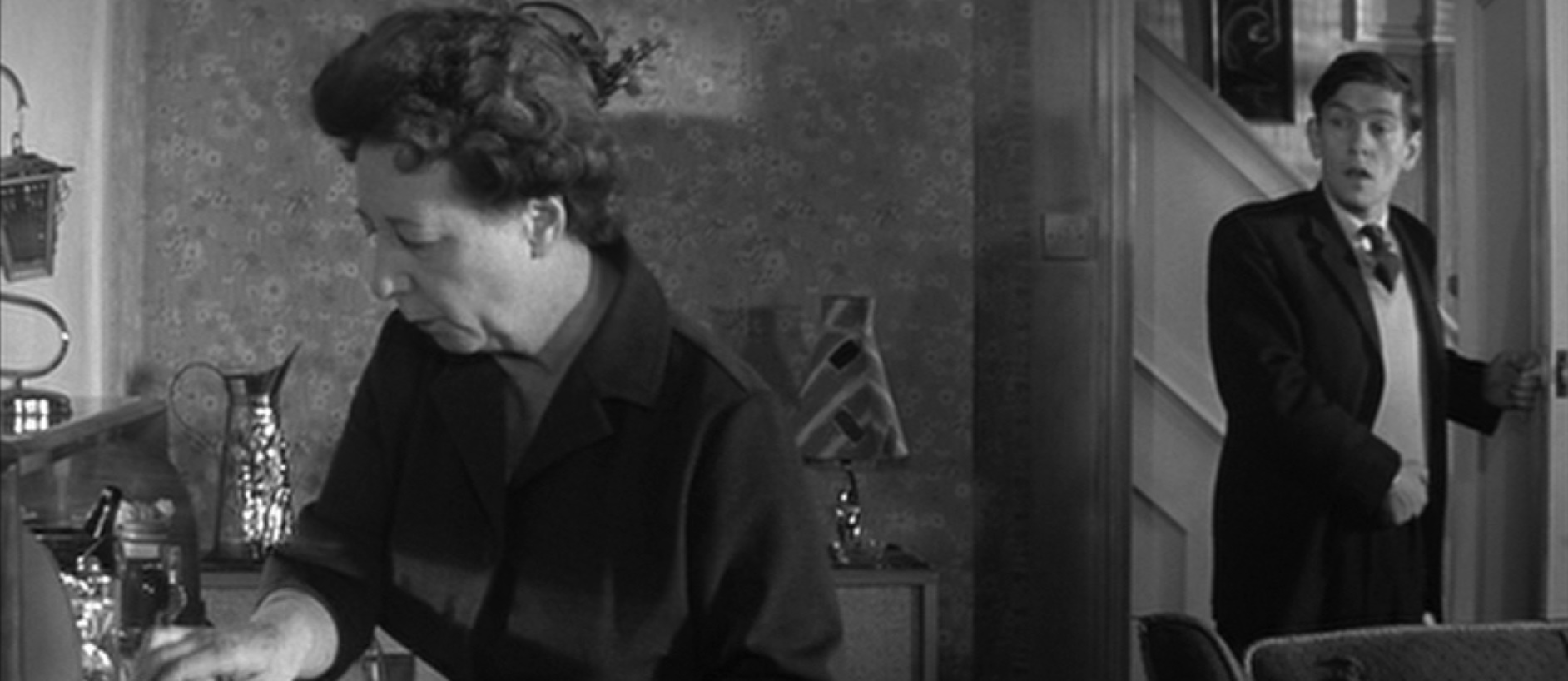 | 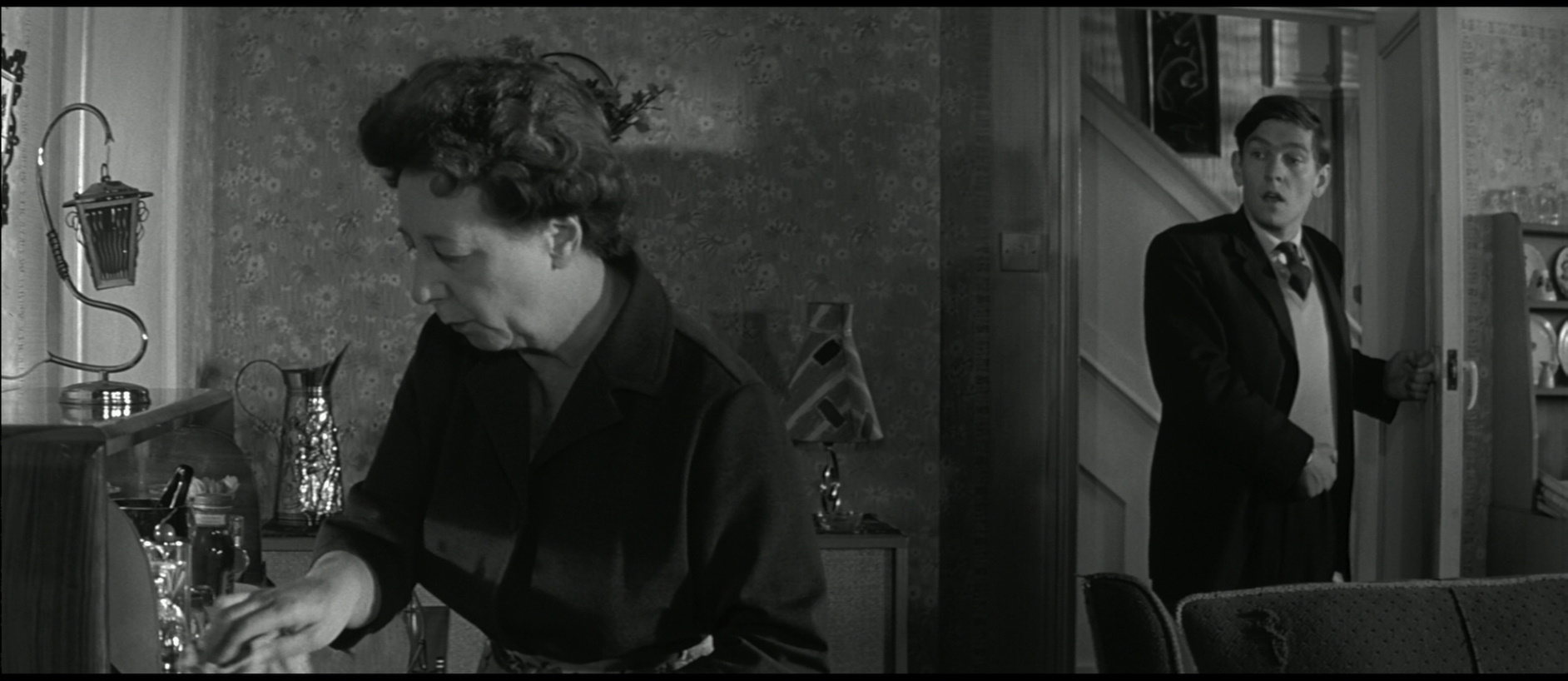 |
| Criterion (2001; DVD) | KL Studio Classics (2020; Blu-ray) |
| [click on any of these thumbnails to enlarge] | |
This Blu-ray edition exposes considerably more information on all four sides of the frame that had long been lost on Criterion's zoomed-in DVD. Contrast, though it remains limited, is considerably more refined as well. The hard ringing of years past has been eliminated. And, of course, detail and clarity are in a different class altogether. That's not to say that this presentation of Billy Liar is in quite the same league as the most outstanding black-and-white CinemaScope films of this era, such as The Innocents and Arrow's remaster of The Apartment. It's rather soft, for one. Billy Liar doesn't offer much in the way of deep, inky blacks or gleaming whites, instead embracing a flatter assortment of grays in-between.
But, as ever, I'm head over heels in love with the look of anamorphic lenses of this era, distortion and all. This is a consistently filmic presentation, even if it's showing its age somewhat as well as the limitations of the elements available. And the remaster is immaculate, free of any wear or even speckling of consequence. Though I do wish that a fresh scan had been in the cards, I'm still sufficiently pleased with what Studiocanal and Kino Lorber Studio Classics have delivered here. This long-awaited Blu-ray release is a worthy introduction to such a seminal film from the British New Wave, and, at least visually, it's an essential upgrade over the nearly twenty year old Criterion DVD.
Billy Liar arrives on a dual-layer Blu-ray disc at an aspect ratio of 2.35:1.
Audio
As compelling an upgrade as Billy Liar's high-def presentation is over Criterion's aging DVD, the same unfortunately cannot be said about its lossless audio. Presented in 16-bit, two-channel mono, this DTS-HD Master Audio soundtrack is thin, brittle, and trebly by comparison:
| Criterion (2001; DVD) | KL Studio Classics (2020; Blu-ray) |
Note the dramatic difference in bass in the radio broadcast that plays over Billy Liar's opening titles:
| Criterion (2001; DVD) | KL Studio Classics (2020; Blu-ray) |
And while this isn't apparent in the excerpts above, which have been normalized, the levels are a good bit lower than expected as well; I had to dial up the volume on my AVR more than a few ticks higher than usual to compensate. Additionally, I'll confess to finding it more of a challenge to discern the 'eavier accents on this Blu-ray release than on the decades-old DVD. While the lossless audio here is thankfully free of any intrusive abberations – no background noise of note, pops, clicks, dropouts, or the like – that's about as much praise as I can muster. Though I have no doubt that the materials Studiocanal made available are to blame, this is still far from a superior effort.
Also included are an audio commentary and an optional set of English subtitles.
Extras
Understandably but disappointingly, this isn't the definitive release of Billy Liar that I would've preferred to have seen. The audio commentary from Criterion's long out-of-print 2001 release – in which since-departed director John Schlesinger was joined by actors Tom Courtenay and Julie Christie – remains exclusive to that disc, as are the excerpts from an episode of Hollywood U.K.: British Cinema in the Sixties. The interviews and retrospectives from Studiocanal's 2013 Blu-ray edition from the other side of the Atlantic were apparently not available to Kino Lorber Studio Classics either.
- Audio Commentary: Though the loss of the filmmakers' commentary stings, this engaging discussion from Kat Ellinger easily ranks as the next best thing. Among the innumerable highlights are Ellinger's contrasting of British New Wave cinema from the movement in France, thoughtful analyses of Billy's conflicts and fantasies, the one line that fell afoul of censors in the UK, Tom Courtenay's relationships with his parents informing his performance, why exactly John Schlesinger was drawn towards CinemaScope for this adaptation, and which sequences proved particularly challenging to film for reasons one might not expect. Ellinger directs a great deal of attention towards the preceding stage play – delving into the markedly different approaches to the title character by Courtenay and Albert Finney, for instance – and explores the many other adaptations and revivals that have followed over the past fifty-someodd years. This is an extraordinary commentary and as essential a listen as they come.
- Trailer (4 min.; SD): The only other extra is a lengthy British trailer.
The Final Word
Given what a significant and enduring film Billy Liar is, a more robust presentation and more extensive selection of extras would easily have elevated this long-awaited Blu-ray release to DVD Talk's Collector Series. Trailer aside, all of the bonus features from previous special editions have been discarded. Its visual presentation is much improved over Criterion's DVD, as one would expect, though Studiocanal's HD master is very much showing its age. Not only does the lossless audio fail to improve upon that nearly twenty year old DVD, but I'd argue that it's in fact a step back. This isn't the Blu-ray release I was hoping to see or hear.
And yet those weaknesses don't inordinately detract from a film that's meant a great deal to me over the past couple of decades. Billy Liar is too compelling a film to warrant anything less than an enthusiastic recommendation, especially when bolstered by such an exceptional audio commentary and an HD remaster that at the very least rates as good enough. I'm still holding out hope for a more definitive edition in the years to come, but in the meantime, Kino Lorber Studio Classics' Blu-ray release very much comes Highly Recommended.
|
| Popular Reviews |
| Sponsored Links |
|
|
| Sponsored Links |
|
|
| Release List | Reviews | Shop | Newsletter | Forum | DVD Giveaways | Blu-Ray | Advertise |
|
Copyright 2024 DVDTalk.com All Rights Reserved. Legal Info, Privacy Policy, Terms of Use,
Manage Preferences,
Your Privacy Choices | |||||||










